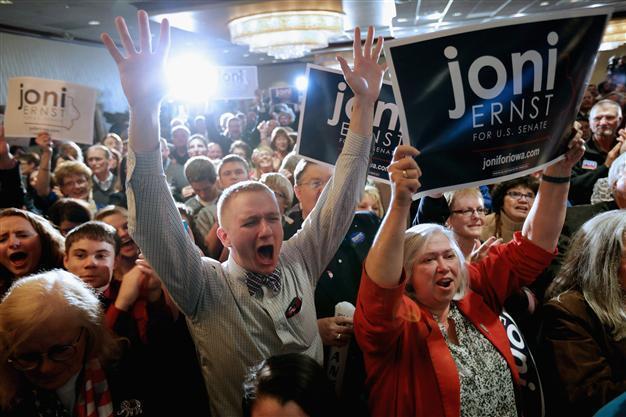Republicans win control of Senate in voter rebuke to Obama
WASHINGTON - The Associated Press

Supporters celebrate after hearing that Republican candidate Joni Ernst won the U.S. Senate race on election night at the Marriott Hotel Nov. 4 in West Des Moines, Iowa. AFP Photo
Republicans won control of the U.S. Senate and bolstered their majority in the House of Representatives as Americans delivered a stinging rebuke to President Barack Obama in elections Nov. 4. Obama now faces the final two years of his presidency contending with a Congress fully controlled by a party that firmly opposes his policies.While Democrats had braced for a tough election night, their battering was beyond expectations. Republicans picked up seven seats - giving them 52 seats in the 100-member Senate and have the potential to win several more, while Democrats didn't take a single Republican seat. In the House, Republicans were on track to build their majority to record levels.
Democrats not only lost high-profile gubernatorial races in Florida and Wisconsin, where they had strong hopes of toppling Republican incumbents, they also lost in Democratic-leaning Massachusetts, Maryland and Illinois, Obama's adopted home state..
Democrats could not even beat Republican Michael Grimm, a New York congressman indicted on tax fraud and other charges who gained national fame by threatening to throw a reporter off a balcony in Congress.
The vote gives Republicans momentum heading into the 2016 presidential race, which will be the focus of American politics for the next two years. Republicans will be especially encouraged by their victories in battleground states that can sway presidential races, such as Florida, Ohio and Michigan.
Republicans had made Obama's presidency the core issue of their campaigns, even though he wasn't on the ballot. They rallied supporters against a president they see as pushing the government too deeply into American lives. They tapped into a well of discouragement at a time many Americans see the economy stagnating and are besieged by troubling news, such as the spread of Ebola and the beheading of Americans by Islamic extremists.
Nearly two-thirds of voters interviewed after casting ballots said the country was seriously on the wrong track. Only about 30 percent said it was generally going in the right direction.
Republican congressional leaders are also unpopular, but it's the president who inevitably gets the brunt of the blame. His approval ratings are near lows for his presidency. Democratic candidates in close races tried as best they could to distance themselves from him.
'Hunger for new leadership'
With Republicans taking control of the Senate, Mitch McConnell, a canny yet uncharismatic senator from Kentucky, will likely become majority leader, one of the most powerful positions in Washington.
McConnell has been a severe critic of Obama, but has also helped broker bipartisan deals that ended last year's government shut down and averted at 2011 federal default. On Nov. 4 he easily defeated Democrat Alison Lundergan Grimes who was once seen as a strong challenger.
Voters are "hungry for new leadership. They want a reason to be hopeful," McConnell said at a victory rally.
Republicans will likely launch a strong assault on budget deficits, pressure Democrats to accept sweeping changes to the health care law that stands as Obama's signal domestic accomplishment and try to reduce federal regulations.
"It's time for government to start getting results and implementing solutions to the challenges facing our country, starting with our still-struggling economy," said House Speaker John Boehner.
Obama was at the White House as results came in. With lawmakers set to convene next week for a postelection session, he invited the congressional leadership to a meeting on Nov. 7.
It's a political low point for a president who electrified the world with his election in 2008 as the first African-American president and was comfortably re-elected in 2012. Though he saw Democrats lose the House in 2010, partly in a backlash to the health care overhaul, this will be the first time he will also have to deal with a Republican-led Senate.
At stake Nov. 4 were 36 of the 100 Senate seats, all 435 House districts and 36 of 50 governors' seats. The spending was unprecedented for a non-presidential year. Congressional races alone cost an estimated $4 billion.
It was bound to be a difficult election for Democrats. Governing parties historically lose seats in midterm votes and a number of Democrats were defending seats in states that lean Republican. Some were first elected to six-year terms in 2008, riding the wave of excitement over Obama's initial candidacy.
Republicans needed a pickup of six seats to take control of the Senate. Three were almost assured - West Virginia, Montana and South Dakota - after long-time Democratic incumbents retired. They also defeated Democratic incumbents in Arkansas, Colorado and North Carolina and won a Democratic-held seat in Iowa left open by a retirement.
Republican gains could continue. Several races are undecided and one, Louisiana, is headed for a Dec. 6 runoff after no candidate won a majority. In a further sign of Democratic woes, one of the races that is too close to call is Virginia, where few suspected that the Democratic incumbent, Mark Warner, was vulnerable.
In the House, only a few dozen races were truly competitive. The dominant parties in state legislatures tend to carve out congressional districts to maximize the number of seats their parties can win, a process known as gerrymandering.
With dozens of House races uncalled, Republicans had picked up 12 seats in Democratic hands, and given up only one. A net pickup of 13 would give them more seats in the House than at any time since 1946.
















